Sri Lanka’s turn

Minnows
Kenya, UAE, Netherlands
Format
Two groups of six: each team played all the others in its group to determine the quarter-finalists. It took 30 matches to eliminate Zimbabwe and the three minnows, then seven more to reduce the remaining Test nations to one winner.
Innovations
Fifteen-over fielding restrictions had made their debut in 1992, but 1996 was the year the pinch-hitters seized their opportunity. Sri Lanka, Australia and India exploited the open spaces with aggressive early batting; England didn't. The third umpire also made his first appearance.
Early running
Sri Lanka finished top of Group A despite beating only India of the fancied teams; Australia and West Indies forfeited matches in Colombo, where over 1000 people had been killed or injured in a terrorist attack three weeks earlier. South Africa were favourites after five hyper-efficient victories in Group B. Gary Kirsten's unbeaten 188 against UAE was a World Cup record. England, meanwhile, lost all three of their games against Test nations, wobbled against Holland, and lost their lunch against UAE (at least Neil Smith did).
The quarters
Sanath Jayasuriya savaged England, who suffered their tenth successive defeat by a Test nation, but captain Mike Atherton got off lighter than Wasim Akram, who dropped out of Pakistan's tie with India, citing a side strain. His Lahore house was stoned after they lost by 39 runs. A spectacular 130 from New Zealand's Chris Harris left Australia in need of their highest total batting second to win an ODI: Mark Waugh's record third hundred of the tournament (he had already become the first man to make successive Cup tons) made sure they got it. The surprise packages were West Indies, who were inspired by Brian Lara's 111 to a 19-run win over South Africa.
The semis
A Calcutta crowd of over 100,000 boiled over as India slid to 120 for 8 in pursuit of Sri Lanka's 251. Fires were started in the stands, leading to a win "by default" for Sri Lanka. India's decline was a surprise, considering Javagal Srinath had removed ballistic openers Jayasuriya and Romesh Kaluwitharana in the first over. Then Aravinda de Silva's 66 led a recovery. That was nothing, however, when compared to Australia's comeback: they were 15 for 4 before Stuart Law and Michael Bevan dragged them to 207 for 8. Then West Indies cruised to 165 for 2 in the 42nd over, but four wickets from Shane Warne and some tactical wizardry from Mark Taylor precipitated an incredible collapse: West Indies lost 8 for 37 in 50 balls, and Richie Richardson was stranded on 49.
The final
No one had dominated a final to the extent that de Silva did in 1996. He took two catches and three wickets, including Australia's top-scorers Taylor and Ricky Ponting, then strolled to an elegant 107 not out. Handicapped by a slippery, dew-covered ball, Australia dropped several chances, and never looked like defending 241.
Controversies
Australia and West Indies forfeited their group matches against Sri Lanka in Colombo, citing security concerns after a bomb went off there before the start of the tournament. Their hard stance was not well received by the organisers.
The opening ceremony in Calcutta was a shambles. Wisden reported that the laser show malfunctioned, the compère was embarrassing and that the grand launch was a complete flop. Calcutta, however, faced a more serious problem later in the tournament, when an unruly crowd, unable to stomach India's impending defeat, disrupted the semi-final against Sri Lanka.

 For all latest news, follow The Daily Star's Google News channel.
For all latest news, follow The Daily Star's Google News channel. 



Comments